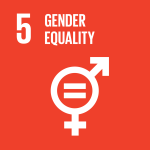
October 2022 – Climate change impacts all members of society. Systemic gender discrimination within society creates a situation where men and women experience climate risks differently as they are vulnerable in different ways. Gender inequity is a powerful barrier to climate action because it prohibits participation in making changes and adapting to climate change.
Promisingly, as countries implement their nationally determined contributions (NDCs) and their National Adaptation Plans, they are taking steps to address gender. An FAO analysis found that 38 percent of the most recent NDCs reference gender and/or other marginalized groups in the agricultural sectors compared to 9 percent of previous NDCs. According to the NAP Global Network, 97 percent of developing countries that have submitted NAPs are integrating gender, and nearly 2/3 include references to capacity-building activities on the intersection of gender and climate change for government officials and adaptation stakeholders.
Building on this momentum, the FAO-UNDP SCALA programme and the UNFCCC PCCB Network brought together a variety of stakeholders from government and civil society for an exchange of experiences in implementing gender-responsive climate action.
The rich discussion highlighted achievements at national and local levels and focused on experiences from across Africa. It was clear that countries were taking steps to integrate gender equality and social inclusion into their NAPs and NDCs in relation to budgeting and planning processes for implementation in the agriculture sector; however, there was room to achieve more.
As explained by the Honorable Winifred Masiko, from the Ugandan Ministry of Gender, Labour and Social Development, Uganda has already done a lot of work to mainstream gender into its policies, such as its Uganda Vision 2040, National Green Growth Strategy and its 10-year Climate Smart Agriculture Program (2015-2025), among others. She shared Uganda’s recent progress on the establishment of a Mandatory Gender and Equity certificate for all sectors that had integrated gender concerns within their budgets.
These national policies have promoted increasing interest towards implementation progress within the agricultural sector linked to the NDCs and NAPs, thereby making the plans more comprehensive and gender-sensitive. Significant strides have been made towards mainstreaming gender in the greenhouse gas inventory systems, as well as appointments of gender focal points within the five priority sectors in the country’s NDC.
To complement these results from the national level, Mr. Peter Wright, from CARE USA, based in Niger, shared lessons learned on women’s engagement in local governance to promote sustainable and transformative solutions in agriculture. He explained how multi-stakeholder platforms serve as an open space that facilitates negotiations between various actors on climate-smart agriculture practices, income-generating activities, and stock-taking practices. He also highlighted how Village Savings and Loans Associations improved governance within the multi-stakeholder platforms by enhancing leadership and technical skills, management skills, accountability, and advocacy. They also contributed to women’s empowerment and benefitted the entire community. Through the multi-stakeholder platforms, a channel emerged for women’s engagement in local-level planning and governance, therefore contributing to the advancement of the NDC priorities and NAPs implementation in Niger.
Ms. Jane N. Reuben, from the Ministry of Agriculture, Livestock, Fisheries & Cooperatives in Kenya, highlighted challenges faced by marginalised groups such as smallholder farmers and women who were more vulnerable to the effects of climate change yet had so much knowledge that could contribute to viable climate solutions. She reported that climate goals were focusing more and more on land use and agriculture, but required major transformation, especially to promote gender equality and social inclusion. She described a planning and budgeting tool the ministry developed to enhance planning and budgeting to address gender gaps in agriculture and inadequate participation in decision-making, access to resources, and opportunities.
Gender-responsive budgeting and climate-responsive budgeting have largely been implemented as two separate agendas, however, there is a growing recognition of the benefits of an integrated approach, including more efficient, effective, and equitable use of climate finance.
Ms. Shanaz Broermann from the Collaborative Africa Budget Reform Initiative (CABRI) explained that there are similarities in the approaches and technical tools used for gender-responsive budgeting and climate-responsive budgeting. She provided examples of technical collaboration through budget tagging and scoring for both gender budget tagging and climate budget tagging to ensure consistency and build awareness in budget planning and financing.
There is a need for improved capacity at government level to implement gender-responsive budgeting, according to research conducted by Ms. Rebecca Rewald of Oxfam America in Ethiopia, Ghana, Nigeria, Tanzania, and Burkina Faso. This enhanced capacity is needed to ensure that gender-responsive budgeting meets the needs of rural women farmers.
Further, leadership by Finance Ministries on gender-responsive budgeting matters was found to demonstrate accountability and transparency through providing clear instructions on how to integrate gender into the various financing processes.
Moreover, accountability mechanisms are needed to ensure that gender is mainstreamed at all phases of the budget cycle. Local-level budgeting allows for a bottom-up approach to plans and budgets, facilitating better responses to community needs.
***
This article is based on discussions held during the “Mainstreaming gender equality in budgeting and planning processes for enhanced implementation of agriculture-sector priorities in NDCs/ NAPs’’ webinar organized by the IKI-funded SCALA programme in partnership with the UNFCCC PCCB Network.


